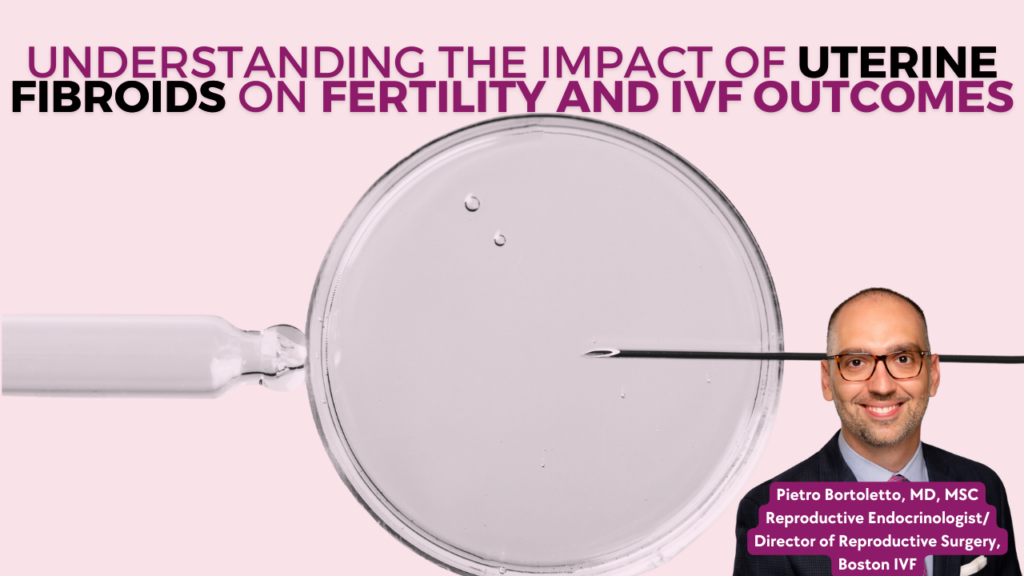
Uterine fibroids are noncancerous growths that develop in the uterus. They are a common condition affecting many women during their reproductive years. While most fibroids do not cause any symptoms or complications, they can have a significant impact on fertility, the outcomes of in vitro fertilization(IVF) and obstetric outcomes.
In this blog post, we will explore the relationship between uterine fibroids, fertility, and IVF, and discuss the available treatment options for women facing these challenges.
The Impact of Uterine Fibroids on Fertility
Uterine fibroids can affect fertility in several ways:
Distortion of the Uterine Cavity: Depending on their size and location, fibroids can distort the shape of the uterine cavity. This alteration can interfere with the implantation of a fertilized embryo and reduce the chances of successful conception.
Interference with Normal Uterine Contractility: Uterine fibroids grow within the muscular layers of the uterus. The uterus routinely has waves of contraction during implantation and early pregnancy that move through these muscular layers. Fibroids may impair this normal contractility and increase chances of expelling an embryo or increasing risk of miscarriage.
Heavy menstrual bleeding: Prolonged or heavy bleeding may create an environment that is less favorable for embryos to implant within the uterine cavity, particularly if bleeding persists around the time of ovulation.
The Impact of Uterine Fibroids on IVF Outcomes
In vitro fertilization (IVF) is a fertility treatment that involves the retrieval of eggs from the ovaries, fertilization of the eggs with sperm in a laboratory, and subsequent transfer of the resulting embryos into the uterus. The presence of uterine fibroids can influence the success of IVF in the following ways:
Increased Difficulty with Egg Retrieval: Egg retrieval is typically performed transvaginally, as the ovaries are easily accessible in their anatomic position. Patients with a large fibroid uterus can have their ovaries moved up and out of the pelvis making them more difficult to visualize and safely access. This may reduce the number of eggs retrieved in a given cycle.
Lower Implantation Rates: Fibroids can affect the implantation of embryos in the uterine lining, reducing the chances of successful embryo attachment and subsequent pregnancy.
Increased Risk of Miscarriage: Studies have suggested that the presence of fibroids can increase the risk of miscarriage after IVF. This may be due to the distorted uterine cavity, impaired blood supply to the developing embryo, or hormonal imbalances caused by fibroids.
Complications during Pregnancy: Women with fibroids who successfully conceive through IVF may be at a higher risk of certain pregnancy complications, such as preterm labor, premature rupture of membranes, and placental abruption.
Treatment Options for those with Fibroids planning to undergo IVF
If you are diagnosed with uterine fibroids and planning to undergo IVF, there are several treatment options to consider:
Fibroid Removal: Depending on the size, number, and location of the fibroids, your doctor may recommend surgical removal before proceeding with IVF. This procedure, known as a myomectomy, can improve fertility outcomes by restoring the normal uterine structure.
Uterine Fibroid Embolization (UFE): UFE is a non-surgical procedure that involves blocking the blood supply to fibroids, causing them to shrink. This treatment modality is typically not preferred in patients hoping to conceive in the future as it is associated with infertility and obstetric complications.
GnRH Agonists/Antagonists: Gonadotropin-releasing hormone (GnRH) agonists/antagonists are medications that can temporarily shrink fibroids by suppressing hormone production. This approach can be used prior to IVF to reduce the size of fibroids and improve the chances of successful implantation.
Combined Treatment: In some cases, a combination of surgical removal, UFE, or medication may be recommended to optimize fertility outcomes before IVF.
Abdominal egg retrieval: If the goal is be able to better access the ovaries during an IVF cycle, abdominal egg retrieval – where the eggs are retrieved via the abdomen instead of via the vagina – may be an option to discuss with your fertility provider.
Uterine fibroids can have a significant impact on fertility and the success of IVF treatment. If you have been diagnosed with fibroids and are planning to undergo IVF, it is important to discuss your options with a fertility specialist. They can evaluate your unique situation and recommend the most suitable treatment approach to maximize your chances of achieving a successful pregnancy. Remember, early
diagnosis and proper management of fibroids can significantly improve fertility outcomes and help you on your journey towards building a family

Dr. Pietro Bortoletto is a Reproductive Endocrinologist and Director of Reproductive Surgery at Boston IVF.
He specializes in all aspects of infertility care with a special interest in diminished ovarian reserve, recurrent pregnancy loss & implantation failure, Müllerian anomalies, fibroids, endometriosis, and Asherman’s syndrome.
Dr. Bortoletto currently serves as the Interactive Associate in Chief for Fertility & Sterility and Media Editor for F&S Reports. His research interest centers around making fertility treatment safer, improving the patient experience, and better understanding how to make fertility care more effective. He has published more than 60 peer-reviewed papers as well as multiple reviews and book chapters.
He lives in Arlington, Massachusetts, with his wife Malavika, a maternal-fetal medicine specialist, and their two small children, Pia And Luca. In his free time, he enjoys playing piano & guitar and is in constant pursuit of how to make the very best cup of coffee.
